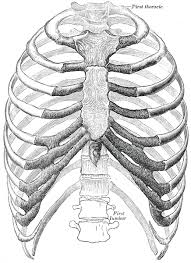记忆方法
1. rib => reef.
2. 谐音“肋部”。
2. 谐音“肋部”。
中文词源
rib 肋骨,排骨,棱纹
来自古英语 ribb,肋骨,来自 Proto-Germanic*rebja,肋骨,来自 PIE*rebh,覆盖,屋顶,词源同 reef.引申词义排骨,棱纹等。
英语词源
- rib
-
rib: [OE] Rib is a widespread Germanic word, which goes back to a prehistoric *rebjō, source also of German rippe, Dutch rib, Swedish ribba ‘lath’, etc. Its Old Norse form rif is the ancestor of English reef. Outside Germanic it is related to Russian rebro ‘rib’.
=> reef - rib (n.)
- Old English ribb "rib," from Proto-Germanic *rebja- (cognates: Old Norse rif, Old Saxon ribbi, Old Frisian ribb, Middle Dutch, Dutch ribbe, Old High German ribba, German Rippe), literally "a covering" (of the cavity of the chest), from PIE *rebh- "to roof, cover" (cognates: Greek ereptein "to roof," Old Church Slavonic rebro "rib, reef"). As an item of food from early 15c. Rib joint "brothel" is slang from 1943, probably in reference to Adam's rib (compare rib "woman, wife," attested from 1580s).
- rib (v.)
- "tease, fool," 1930, apparently from rib (n.); perhaps as a figurative suggestion of poking someone in the ribs. Related: Ribbed; ribbing.
权威例句
- 1. The goalkeeper was stretchered off just before half-time with a rib injury.
- 就在中场休息前,该守门员由于肋骨受伤被用担架抬下场。
- 2. Use a cheap cut such as spare rib chops.
- 用一块便宜点的肉,比如肋排肉。
- 3. The guys in my local pub used to rib me about drinking "girly" drinks.
- 我家当地酒馆里的人以前总是取笑我喝“女人”饮料。
- 4. The doctor fixed the rib, dosed him heavily with drugs, and said he would probably get better.
- 医生接好了肋骨,给他服用了大剂量的药,并说他可能会有所好转。
- 5. You've fractured a rib, maybe more than one.
- 你的一根肋骨断了,可能不止一根。
